Scope, contexts and social effects of information flow / of solidarity in Russian social media (2023-2024)
The relevance of the study is determined by the urgency and significance of identifying the factors and patterns that promote and hinder political solidarity and political consolidation of modern Russian society in the context of growing international tension. Research problem. The discrepancy between the scale, technological content, user resonance and involvement of national Internet audiences in social media information flows of solidarising and dissolidarising orientations in the context of international tension. Methods. The research design includes methods of cognitive mapping of 600 relevant social media documents selected using a targeted sample from Telegram, VKontakte and Odnoklassniki (database processing tool – IBM SPSS Statistics 23.0) and automated monitoring of social media (data accumulation and processing tool – Medialogy). Download depth: 01.01.2023-31.03.2024, collected database size: 11,446,132 documents from 100 most popular digital platforms among Russians. Scientific results. The main results of the study are obtaining empirical evidence of the significant potential for the influence of dissolidarising flows; identifying the grounds for solidarity in social media flows, techniques for forming an attitude towards social unity and consolidation; establishing weight indicators for the prevalence of solidarity and dissolidarisation flows in the Russian national segment of social media platforms, the size of the audience involved in these multidirectional flows, its age and geolocation composition. Significant results of the applied analysis also include data on the dependence of the dynamics of solidarizing and dissolidarising flows and the size of their audience on the intensity of the socio-political agenda, which indicates the need of Russians to create an information base for political and civil consolidation in the face of ever-increasing external destructive influence. Conclusions. Dissolidarising flows have significant effects on public consciousness due to their more emotional and manipulative impact compared to solidarising flows. There is a certain deficit in the circulation in the social media of the Russian Federation of such grounds for solidarity as a common language, traditional religions, the unity of centuries-old history, common destiny, historical memory, culture, the importance of combining efforts, joint actions, civic participation in the process of achieving the goals set before society in the context of current global challenges.
Figures
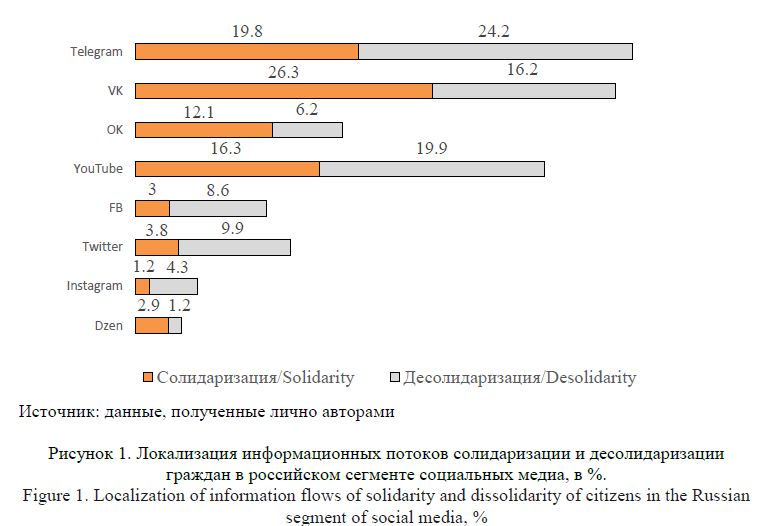
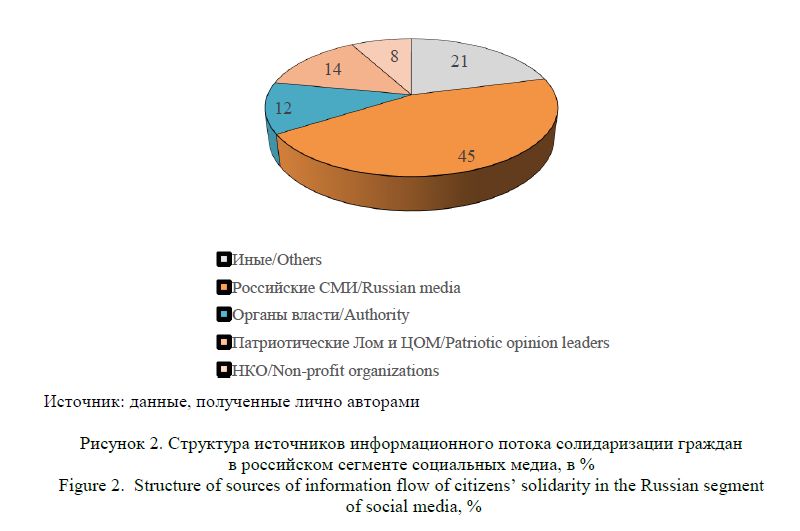
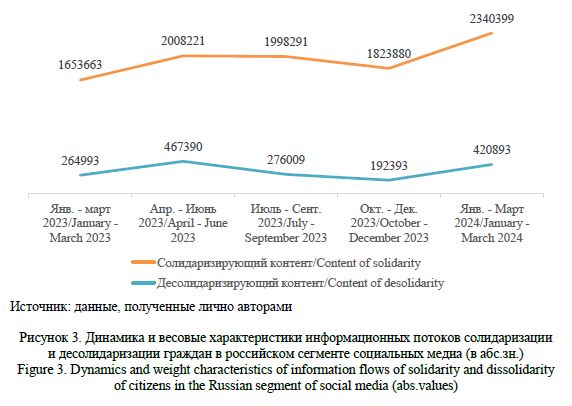
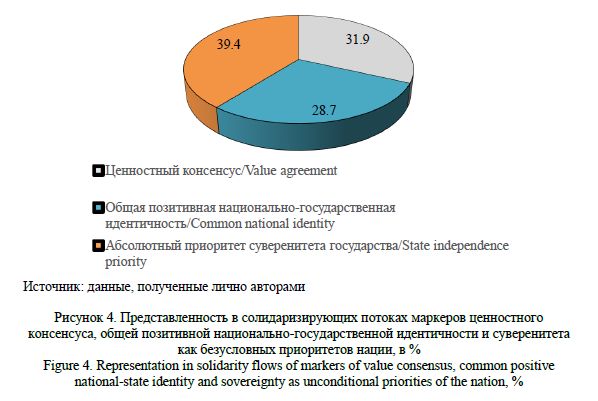
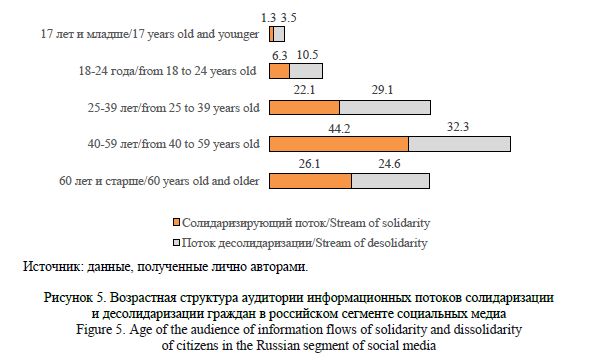
Dombrovskaya, A. Y., Brodovskaya, E. V. (2025), “Scope, contexts and social effects of information flow of solidarity in Russian social media (2023-2024)”, Research Result. Sociology and Management, 11 (1), 71-90, DOI: 10.18413/2408-9338-2025-11-1-0-5.


















While nobody left any comments to this publication.
You can be first.
Azarov, A. A., Brodovskaya, E. V., Bubnov, A. Yu., Glazkov, A. A. et al. (2013), “Predictor mining: application of data mining methods in social computing tasks”, Trudy SPIIRAN, (3(26)), 136-161. (In Russian)
Brodovskaya, E. V., Dombrovskaya, A. Yu., Karzubov, D. N., Sinyakov, A. V. (2017), “Development of methodology and techniques for intelligent search of digital markers of political processes in social media”, Monitoring obshhestvennogo mneniya: ekonomicheskie i sotsialnye peremeny, (5), 79-104. (In Russian)
Durkheim, E. (1990), O razdelenii obshhestvennogo truda. Metod sotsiologii [On the division of social labor. The method of sociology], Nauka, Moscow, Russia, 575. (In Russian)
Ilyicheva, L. E., Rogachev, S. V. (2022), “Risks and challenges of social consolidation of Russian society in the context of civilizational transformation”, Vlast, 30 (5), 88-97, DOI: https://doi.org/10.31171/vlast.v30i5.9243. (In Russian)
Karmova, M. R., Maksimova, O. I. (2022), “Intercultural communication: the path to solidarity between ethnic communities”, Gumanitarnye nauki. Vestnik Finansovogo universiteta, 12 (3), 30-35, DOI: 10.26794/2226-7867-2022-12-3-30-35. (In Russian)
Karmova, M. R., Maksimova, O. I. (2023), “Phenomenon of communicative solidarity and communicative conflict in social media”, Gumanitarnye nauki. Vestnik Finansovogo universiteta, 13 (1), 122-127, DOI: 10.26794/2226-7867-2023-13-1-122-127. (In Russian)
Konkov, A. E., Batovrina, E. V., Mikhailova, O. V. (2021), “The state and society in search of solidarity: together or nearby?”, Obshhestvennye nauki i sovremennost, (1), 29-47. (In Russian)
Okara, A. N. (2013), “Solidarism: the forgotten ideology of the 21st century”, Politicheskaya nauka, (4), 146-155. (In Russian)
Parsons, T. (1993), “The concept of society, components and their relationships, THESIS, (2), 94-122. (In Russian)
Hayek, F. A. (2006), Pravo, zakonodatelstvo i svoboda: Sovremennoe ponimanie liberalnyh printsipov spravedlivosti i politiki [Law, legislation, and freedom: A modern understanding of liberal principles of justice and politics], IRISEN, Moscow, 644. (In Russian)
Alharbi, A., Freeman, B. C. (2018), “Towards a performative theory of solidarity discourse”, Cogent arts & humanities, 5 (1), 1495-044.
Archer, M. S. (2007), Making our way through the world, Cambridge University Press, 343.
Archer, M. S. (2014), Introduction: ‘Stability’ or ‘stabilization’ – on which would morphogenic society depend? Late Modernity, Cham, 20.
Dobrzanski, D. (2005), “The concept of solidarity and its properties”, Eastern Europe and the challenges of Globalization, Council for Research in Values and Philosophy, Washington, D.C., 135-146.
Heckathorn, D. D. (1991), “Extensions of the prisoner’s dilemma paradigm: The altruist’s dilemma and group solidarity”, Sociological theory, (9), 34-52.
Molm, L. D., Collett, J. L., Schaefer, D. R. (2007), “Building solidarity through generalized exchange: A theory of reciprocity”, American Journal of Sociology, (113), 205-242.
Sorokin, P. A. (2002), The ways and power of love: types, factors, and techniques of moral transformation, Templeton Press, 584.
The article was prepared based on the results of research carried out at the expense of budgetary funds under the state assignment of the Financial University.